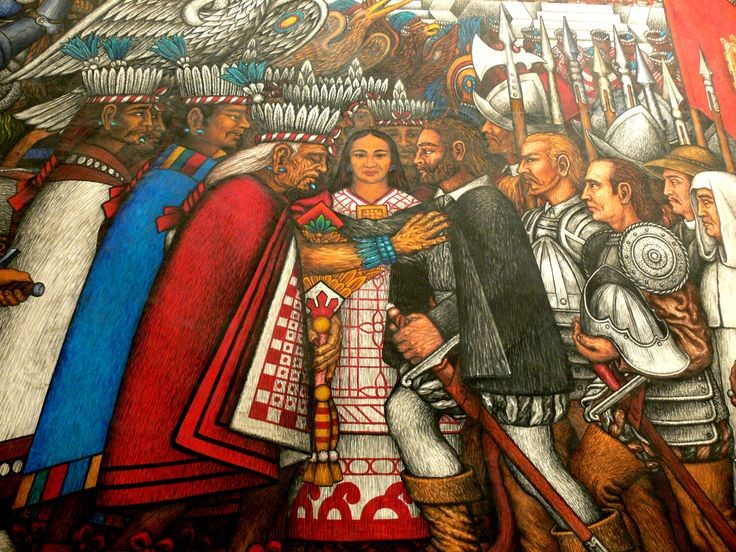 Image of an interpreter from the tomb of the Pharaoh Horemheb, circa 1300 BC. |
|||
|
They are found in the murals in ancient Egyptian tombs. |
|||
 Interpreters at work at the United Nations. |
They are lauded as indispensable links… |
||
| …and reviled as traitors. |  Mural by Desiderio Hernández Xochitiotzin showing Moctezuma, Cortez and Malintzin located in Tlaxcala City, Mexico. |
||
They walk in two worlds, building bridges between people who speak different languages. And, according to the U.S. Department of Labor, they are one of the fastest-growing segments of the U.S. economy.1
Welcome to the fascinating world of interpreters!
Whether trying to converse in a diplomatic setting, in an international business negotiation, or in a local hospital, many professionals today depend on interpreters to help them communicate with people who speak a different language. And it’s no wonder! Aside from our growing international communications, Americans are—and always have been—a rich mixture of languages and cultures even within our borders. 25 million people in the U.S. speak a language other than English at home. Many of these are bilingual—speaking English and another language well—but 8.5% of the population is limited English proficient. That’s a lot of people! So from banks that see a potential market to doctors who want to understand their patients, lots of industries depend on interpreters. Let’s take a look at the fascinating world of interpreters.
Community Interpreters
Community interpreters help people who speak limited English access public services. These interpreters work in hospitals and clinics, in social service agencies, in schools, in courts and with the police.
Business Interpreters
Business interpreters work in international businesses, helping companies forge bonds and negotiate contracts with partners in other parts of the world.
Conference Interpreters
Conference interpreters are the ones you see at the United Nations, way up in the back in the booths, providing simultaneous interpretation over headsets to all the meeting participants. They will be in place at any large international conference, whether the topic is agriculture, human rights or environmental protection.
Diplomatic Interpreters
Diplomatic interpreters accompany statespeople who travel outside their countries, standing beside and behind the speaker, rendering his or her discourse to a colleague over dinner or to an entire country in a televised speech.
Escort Interpreters
Escort interpreters are contracted by the U.S. State Department to accompany foreign guests of the U.S. government during their stay in this country. These guests could be visiting automotive plants in Detroit or wind farms in California. Escort interpreters are “on” 24/7, providing a communication link for visitors wherever they go.
What in the world is an interpreter? Maybe it’s you!
Are you bilingual? Could you see yourself in one of these exciting careers? If you said yes, you may have a future in this fast-growing industry. Part skill and part art, part head and part heart, interpreting is one of the oldest professions in the world. Because no matter how many languages divide us, interpreters will always be there to build the bridge.
1 17.7% growth between 2016 and 2026, compared to 7.4% for all occupations, Bureau of Labor Statistics, Table 1.2 Employment by detailed occupation.
Be the Bridge!
Learn more about getting trained
as an interpreter at www.vcinm.org


